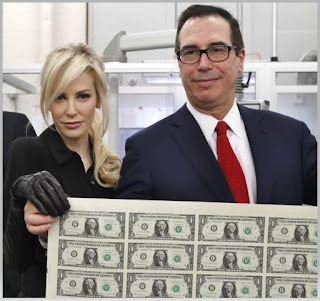Those
who control, or are perceived to control, the societal form of money walk a
perilous line. On one hand, they are highly compensated and enjoy luxuries
afforded to few. On the other hand, if the skewed distribution of wealth causes
intolerable stress for many others, then those perceived to control the
societal form of money may suffer the wrath of a Market correction.
Albert Speer: His Battle with Truth by Gitta Sereny
(WWII)
"You have to think," Dr. Huphauer said,
"that multiplying that ‘seven million unemployed’ figure by a conservative
three to include families, there were then about twenty million people in need,
with no unemployment insurance and only the most minimal social security
benefits. When the earlier catastrophe, the inflation, struck, when a loaf of
bread cost a million marks and butter and meat ceased to exist for millions of
people, they grew to hate - really hate - anyone who had money, thereby
exacerbating the already profoundly resented class system."
When
the societal form of money does not function well for many, those who maintain
wealth are perceived by the others to be privileged and conspirators. When
monetary stress becomes critical, the simplistic tagging of all wealthy people
prevails.
Tagging
a specific social group that has been significantly woven into a society and
then ripping that group from the fabric will tear the society significantly.
All societal members will suffer the tear, rippling through generations.
Instead,
monetary frustrations should be focused towards eliminating flawed monetary
concepts as root causes of monetary stress and cyclical conflict, a window of
opportunity to make progress towards a more perfect Market.
The Power Elite by C. Wright Mills, 1956
When a handful of men do not have jobs, and do not
seek work, we look for the causes in their immediate situation and character.
But when twelve million men are unemployed, then we cannot believe that all of
them suddenly got lazy and turned out to be no good. Economists call this
structural unemployment – meaning that the men involved cannot themselves
control their job chances. There is little or nothing that one ordinary man in
one factory in one town can do about it when it sweeps over his personal
milieu.
The History of Money by Jack Weatherford, 1997
(WWII)
Everyone seemed to be looking for a scapegoat to
take the blame for the calamitous monetary and economic fallout of the era. In
each country, politicians attacked the wealthy class or some particular segment
of it - the aristocrats and landed peasants in Russia and the Armenians in
Turkey, for example, or the Jews in Germany.
Privilege
a right, immunity, or benefit enjoyed only by a
person beyond the advantages of most: the privileges of the very rich.
Progressive Kristallnacht Coming? by Tom Perkins
24 Jan 2014 - Wall Street Journal
I would call attention to the parallels of fascist
Nazi Germany to its war on its "one percent," namely its Jews, to the
progressive war on the American one percent, namely the "rich." This
is a very dangerous drift in our American thinking. Kristallnacht was
unthinkable in 1930; is its descendant "progressive" radicalism
unthinkable now?
The Sympathizer by Viet Thanh Nguyen, 2017 (Vietnam
War)
We had not chosen to be debased by the French, to
be divided by them into an unholy trinity of north, center, and south, to be
turned over to the great powers of capitalism and communism for a further
bisection, then given roles as the clashing armies of a Cold War chess match
played in air-conditioned rooms by white men wearing suits and lies.





No comments:
Post a Comment